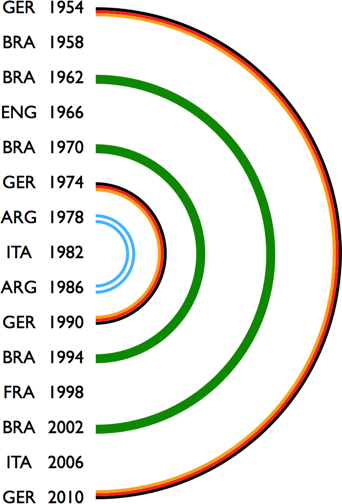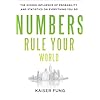Why Germany wins the 2010 World Cup
There are certainly many models, which try to “calculate” which team will win the 2010 soccer world cup. Looking at the teams that already dropped out, the range of models which were obviously not predicting correctly gets quite big. Here is a visualization of my favorite:
For those of you, who more believe in numbers and don’t want to be fooled by visual explanations, the years in which the (multiple) cup winners succeeded all add up to 3,964. Like for all good models, we have outliers, i.e., two of the outcomes do not fit the model, which – hey- is 2 out of 15 = 13% error.
Most importantly though, a good model predicts the things we believe in. All over all, I think the model fulfills all good practices of classical statistics. The only thing that makes me think a bit are the team to beat to get to the prediction: Argentina, Spain, Brazil.
Anyway, good to have a second “evidence” apart from the octopus.
Update: I did this in Apple’s Keynote, as I was to lazy to give protovis a try – anyone more ambitious?





»WHY GERMANY WINS THE 2010 WORLD CUP«
what about talent, passion, intelligence and being a team?
just sayin’ 😉
Then it looks like the US has got some time.
2/15 is not correct, it should be 2/7.5 or 4/15
Right, 4 out of 15 don’t match, that means that 2 of the 4 need to be changed to get a perfect match, i.e., 2 out of 15 must be counted as errors.
This is easy to understand when you look at the following comment on the visualization: “So England missed their chance in 1998 and are doomed never to win it again? Sounds accurate to me ;-)”
I think the model fulfills all good practices of classical statistics
==> causality? Lol
So… Uruguay should win the next cup.
Argentina? Done! …and forget about Brazil.
It could have been different:
http://www.youtube.com/watch?v=8ktcl_Hu-s4
This is an interesting model. I used the same model to ‘predict’ the next World Cup in Brazil and the winner’s, according to this model, will be Uruguay. The ironic thing is, the 1950 World Cup was hosted in Brazil too.
Furthermore, I did the same thing for the 2018 World Cup which will be hosted in either Belgium/Netherlands, England, Russia, Portugal/Spain or United States and the winner of the World Cup in 2018 should be…nobody. There was no World Cup in 1946 because of the war.
don’t forget that even the 1966-1998 winners are also symmetric in a way
both world cups were won by the organizing country team!!
that only leaves Italy’s victory in 2006 out of the model.
Does that mean France and England are tighted together?
Pay attention when you want to predict future events based on past events! The following excerpt is taken from the transcript of a Charlie Rose interview to Nassim Taleb. Take a read and reflect:
CHARLIE ROSE: And what is the “story of the turkey”?
NASSIM NICHOLAS TALEB: The “story of the turkey” is that a turkey is fed for 1,000 days by a butcher, and every day confirms to the turkey and the turkey’s economics department and the turkey’s risk management department and the turkey’s analytical department that the butcher loves turkeys, and every day brings more confidence to the statement. So it’s fed for 1,000 days…
CHARLIE ROSE: Gets fatter and fatter and fatter.
NASSIM NICHOLAS TALEB: Fatter and fatter. On the day when its comfort will be at its maximum, there is going to be a surprise. There will be a surprise for the turkey.
CHARLIE ROSE: Yes.
NASSIM NICHOLAS TALEB: There will be a surprise for the turkey’s economics department, all those Ph.D.’s. Will it be — after all, there’s maximum (inaudible)…
CHARLIE ROSE: But it’s not a surprise for the butcher, is it?
NASSIM NICHOLAS TALEB: Not a surprise for Charlie Rose as well. Not a surprise for humans. It’s a surprise for the turkey. So the whole idea here is we are not to be a turkey.
Will there be a turkey in this World Cup?
…
Warum Deutschland Meister wird:…
Convincing stuff. Just off to Ladbrookes to place a bet on Germany. I hope you’re right! :S
wow – the odds are goood!
“I think the model fulfills all good practices of classical statistics”
Umm.. sorry… but fifteen outcomes are not enough to prove this statisically…
the model has multiple outcomes and the sample size is less than 30… hence no normal curve.. no poisson and no binomial….
only opition is monte carlo…which is basically random number simulation….
however.. it is a good read… similar to liverpool winning champions league and pope dying in the same year …
Learn English, it’s “Why Germany will win the 2010 World Cup”…
The German’s have what it take to win the 2010 World Cup.
“Argentina, Spain, Brazil”
Argentina beat, then Spain and then either The Netherlands (likely since they beat Brazil and have not been beaten since the start of the qualification) or Uruguay (less likely now that one of the two star players, Suarez, is suspended).
I’m hoping for Ned – Ger, a classic!
[…] ways as in 2005, 2006, 2007, 2008 and 2009. Contrary to the world cup, I swear not to give any model that predicts the winner […]
World Cups from 1930 to 1950 are missing. Why? Because the model doesn’t fit??
@ marcus
“what about talent, passion, intelligence and being a team?”
All that’s absolutely over-estimated. Numbers and calculations: that’s the sole truth!
Did you steal this graph from Goal.com or did they steal it from you?
They actually “stole” it from my blog. Should at least have given a reference to the original …
Your stats and modeling would get you a D- at university, but I like the prediction anyway 😛
Did you learn to check for causality in your stats course at university? I would guess not 😉
[…] it’s Paul against the statistics now! […]
As far as I know, Paul erred on the European Cup finals in 2008 as well and predicted Germany – who lost. Apparently Paul can’t get this right for this particular opponent 😉 Let’s see who will win tonight!
@sdrawkcaB
not exactly. It’s because the relating years are in the future. Regarding to 1950 would be the year 2014, for example. Hence if the model is right, Uruguay get the Cup in 2014, and Italy in 2026 again 😉
Your model implies that after 2010 Germany will not win the world cup ever again, since it has never won the world cup before 1954.
Even worse, it implies that there won’t be a world cup after 2034, since the first one was in 1930.
On the other hand, it also proves that the world does not end in 2012, which seems to be a good thing in my point of view.
Tobbi
A big hug from germany, cause it seems so clear now.
My bet this year was urugay, but with your model
its easy to see, that urugay will win the cup next year.
Compliment for the visualization!
2 out of 15 is correct. He wrote, “the years in which the (multiple) cup winners succeeded all add up to 3,964.”
England and France are no multiple winners. In fact, according to model the they can never win again. Well, we all knew that from England and seeing the French playing this time…. sounds accurate to me, too.
martin, im sorry but 1930 + 1950 does not add up 3964. there is no pattern, this is just made up statistics to suit your own whim.
also, the history of the world cup teaches us little about who will win the next one, otherwise uruguay, having won the first one will have won all since! the only thing that can be inferred is that european teams find it harder to win the cup away from their own continent, but that is no longer the case,
alex, ever considered this to be big fun and not statistics ?
statistics failed ^^
but a big fun anyway 😉
[…] wie Martin Theus mittels einer Grafik klar bewies. In seinem englischsprachigen Artikel »Warum die deutsche Mannschaft den World Cup 2010 gewinnt« erklärt er zusätzlich, was schon auf den ersten Blick auf die mitgelieferte Grafik […]
[…] Why Germany wins the 2010 World Cup(Statistical Graphics and more) 1954年以降の優勝国をもとに作成されたインフォグラフィックですが、こうもきれいな結果だったとは驚きました。 […]
The model accurately predicted the Uruguay 4th place in the 2010 cup as they ended in that position in 1954
Fernando,
perfect! Thanks for the hint, that at least gives the model some accuracy ;-).
Cheers
Martin
Ganz schön klasse was hier alles so mit Statistik betrieben wird. Einige Schmunzler kann ich mir dann doch nicht verdrücken… Danke für einen tollen Beitrag und eine Einführung in Statistik in Bezug auf Fußball… Auch wenn der vorhergesagte Erfolg der dt. Nationalmannschaft nicht gegönnt war 🙂
[…] Darum: Why Germany wins the 2010 World Cup […]